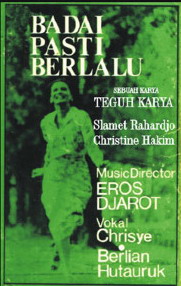
Herlina Christine Natalia Hakim is an Indonesian actress, film producer, and activist. Born to a devout Muslim family of a mixed-race background in Jambi, she grew up in Yogyakarta, aspiring to be an architect or psychologist. This changed after she was discovered by Teguh Karya for his 1973 movie Cinta Pertama, a role which garnered her a Citra Award for Best Actress and convinced her to follow a career in acting. Since then, she has starred in numerous films, including 1977's Badai Pasti Berlalu and 1988's Tjoet Nja' Dhien; she also had a minor role in the 2010 Hollywood movie Eat Pray Love. As of 2011, she has won six Citra Awards, received a lifetime achievement award from the Cinemanila International Film Festival, and served as a member of the jury at the Cannes Film Festival.

Badai Pasti Berlalu is an Indonesian novel written by Marga T and published in 1974. It spawned award-winning film, music album, and a song of the same name.

Badai Pasti Berlalu is a 1977 Indonesian film based on the novel of the same name by Marga T. It was directed by Teguh Karya and starred Christine Hakim, Roy Marten and Slamet Rahardjo.
"Badai Pasti Berlalu" is an Indonesian song written by Eros Djarot and released in 1977 as part of the soundtrack of Badai Pasti Berlalu. It was originally sung by Berlian Hutauruk, but has also been covered by Chrisye and Ari Lasso. Rolling Stone Indonesia ranked it as the third best Indonesian song of all time.
Berlian Hutauruk is an Indonesian soprano of Batak descent. Beginning her career singing religious music in church, Hutauruk later sang for movie soundtracks and released a solo album. She is best known for singing "Badai Pasti Berlalu", which Rolling Stone Indonesia selected as the third-best Indonesian song of all time in 2009.

Teguh Karya was an Indonesian film director. Starting his entertainment career in theatre, he made his directorial debut with Wadjah Seorang Laki-Laki, released three years later. He later directed numerous critically acclaimed films, including Cinta Pertama, Badai Pasti Berlalu, and November 1828. In 2001 Karya died from complications from a 1998 stroke.

November 1828 is a 1979 Indonesian historical drama directed by Teguh Karya. Production cost an estimated Rp 240 million, making it the most expensive Indonesian movie up to that point. It tells the story of a village struggling against the Dutch colonial military during the Java War, and touches on the themes of nationalism and cultural identity. The movie won 6 Citra Awards.

Cinta Pertama is a 1973 Indonesian romance film directed by Teguh Karya. Starring Christine Hakim, Slamet Rahardjo, and N. Riantiarno, it tells the story of Ade, a young woman who falls in love with Bastian, an ex-convict, yet is engaged to Johny, who raped Bastian's wife and caused her to be killed in the resulting fight. It was well-received both critically and commercially, garnering five Citra Awards and launching Christine Hakim's career. Tabloid Bintang has listed it as the 19th best Indonesian film of all time.

Slamet Rahardjo Djarot or better known as Slamet Rahardjo is an Indonesian actor, director, and screenwriter of Javanese descent. He is the elder brother of director, songwriter, and politician, Eros Djarot. Since his directorial debut in 1979 with Rembulan dan Matahari, he has directed and/or written twelve films; one of which, Langitku, Rumahku, was Indonesia's submission to the 63rd Academy Awards in 1991.

Sjumandjaja was an Indonesian director, screenwriter, and actor. During his career he wrote numerous films, directed fourteen, acted in ten, and produced nine; he also won five Citra Awards from the Indonesian Film Festival. His films reflected social realism.

Ahmad Salim, better known by his birth name Wim Umboh but also known by the Chinese name Liem Yan Yung, was an Indonesian director who is best known for his melodramatic romances.

Roy Wicaksono Abdul Salam, better known by his stage name Roy Marten, is an Indonesian actor.
Khadijah Azhari, better known as Ayu Azhari, is an Indonesian actress, model and author of mixed Indian and Sundanese descent.
Wadjah Seorang Laki-laki is a 1971 Indonesian film directed by Teguh Karya. It marked his directorial debut.

Pacar Ketinggalan Kereta is a 1989 film by Indonesian director Teguh Karya. It was his last feature film.

Tuti Indra Malaon, born Pudjiastuti Suratno, was an Indonesian actress, dancer, and lecturer.

Giri Tunggal Heroes' Cemetery is a cemetery in Semarang, Central Java. It contains the graves of military personnel and other persons deemed heroes by the Indonesian government, including the National Hero Albertus Soegijapranata. As of 2011 it has 1,843 interments.

Niniek L. Karim is an Indonesian actress who has won two Citra Awards for Best Supporting Actress.

What They Don't Talk About When They Talk About Love is a 2013 Indonesian drama film written and directed by Mouly Surya. The film stars Nicholas Saputra, Ayushita, and Karina Salim as teenagers involved in a complex relationship while dealing with their disabilities.












